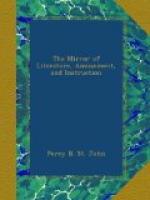Many were the words of gratulation and goodluck which were bestowed on Robin Oig. The judges commended his drove, especially the best of them, which were Robin’s own property. Some thrust out their snuff-mulls for the parting pinch—others tendered the doch-an-dorrach, or parting cup. All cried—“Good-luck travel out with you and come home with you.—Give you luck in the Saxon market—brave notes in the leabhar-dhu, (black pocket-book,) and plenty of English gold in the sporran (pouch of goat-skin.)”
The bonny lasses made their adieus more modestly, and more than one, it was said, would have given her best brooch to be certain that it was upon her that his eye last rested as he turned towards his road.
Robin Oig had just given the preliminary “Hoo-hoo!” to urge forward the loiterers of the drove, when there was a cry behind him.
“Stay, Robin—bide a blink. Here is Janet of Tomahourich—auld Janet, your father’s sister.”
“Plague on her, for an auld Highland witch and spaewife,” said a farmer from the Carse of Stirling; “she’ll cast some of her cantrips on the cattle.”
“She canna do that,” said another sapient of the same profession—“Robin Oig is no the lad to leave any of them, without tying Saint Mungo’s knot on their tails, and that will put to her speed the best witch that ever flew over Dimayet upon a broomstick.”
It may not be indifferent to the reader to know, that the Highland cattle are peculiarly liable to be taken, or infected, by spells and witchcraft, which judicious people guard against by knitting knots of peculiar complexity on the tuft of hair which terminates the animal’s tail.
But the old woman who was the object of the farmer’s suspicion, seemed only busied about the drover, without paying any attention to the flock. Robin, on the contrary, appeared rather impatient of her presence.
“What auld-world fancy,” he said, “has brought you so early from the ingle-side this morning, Muhme? I am sure I bid you good even, and had your God-speed, last night.”
“And left me more siller than the useless old woman will use till you come back again, bird of my bosom,” said the sibyl. “But it is little I would care for the food that nourishes me, or the fire that warms me, or for God’s blessed sun itself, if aught but weal should happen to the grandson of my father. So let me walk the deasil round you, that you may go safe out into the far foreign land, and come safe home.”




